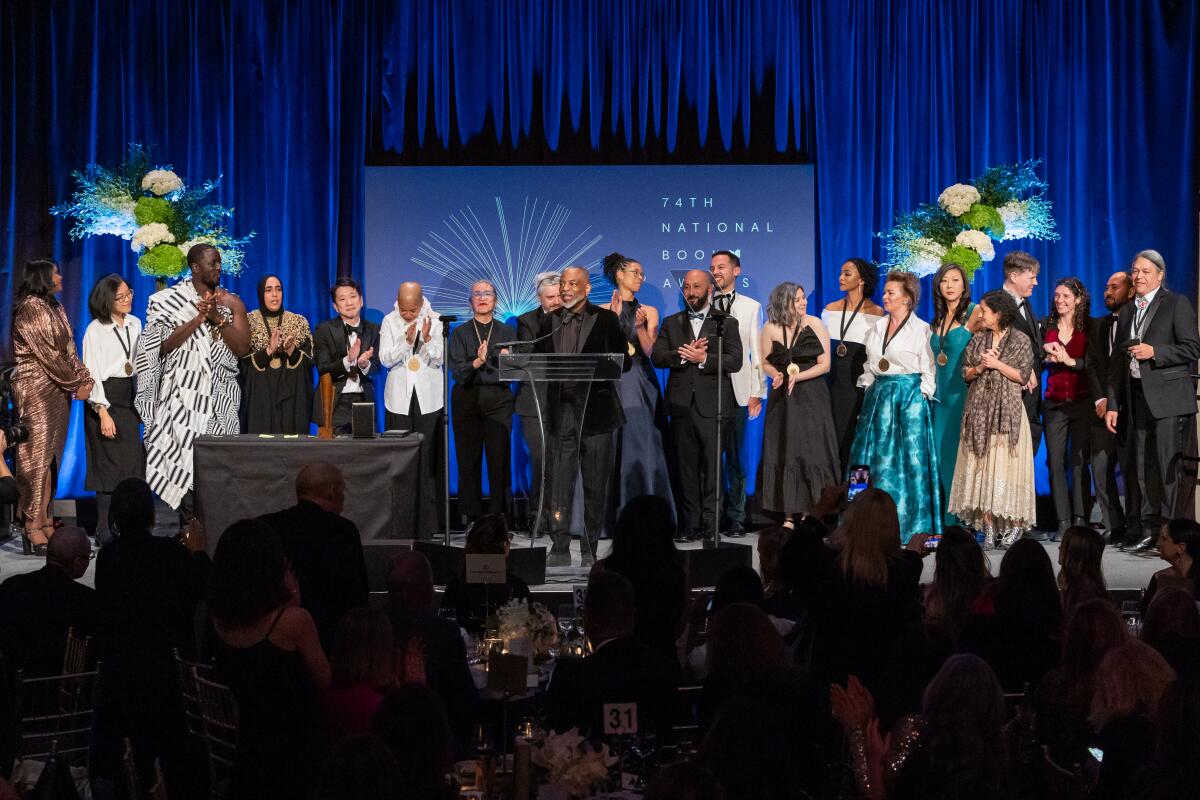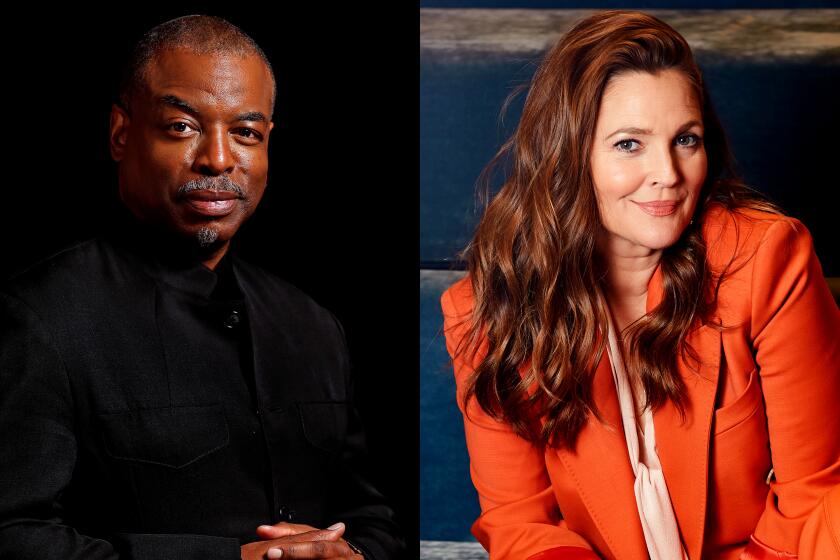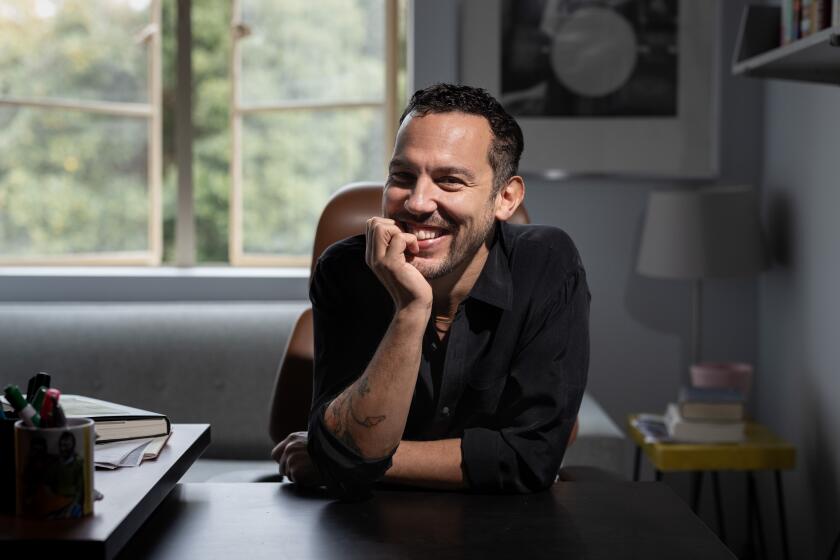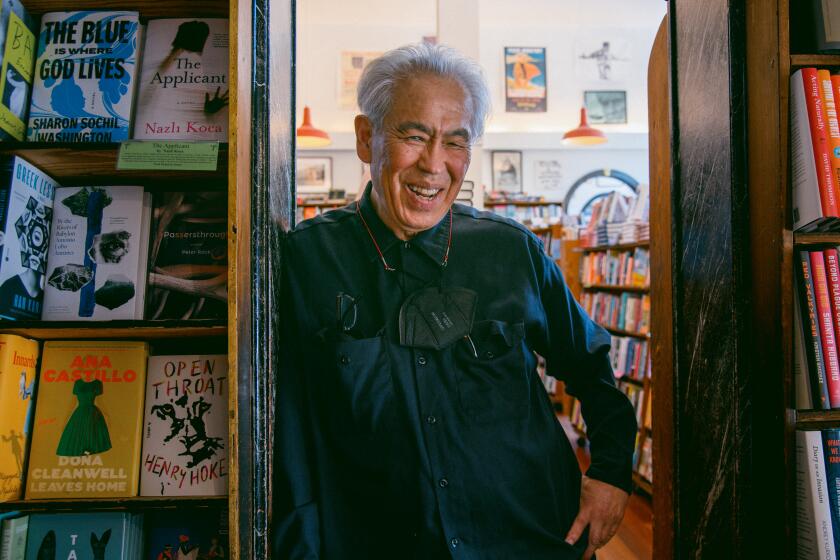Justin Torres, Ned Blackhawk win National Book Awards as war, politics grab spotlight

- Share via
L.A. author Justin Torres and Yale historian Ned Blackhawk were the big winners at the 74th National Book Awards, honored for their works in fiction and nonfiction, respectively, as the prestigious literary prizes were announced Wednesday at a gala at Cipriani Wall Street in New York City. But they shared the spotlight with a closing speech about the Israel-Hamas war, preceded by a controversy over free speech and the role of politics in literary culture.
After Torres, who won for his second novel, “Blackouts,” gave a brief acceptance speech, he handed the microphone to his fellow fiction finalist, Aaliyah Bilal, who read a carefully prepared statement as more than a dozen other finalists stood behind her.
“We oppose the ongoing bombardment of Gaza and call for a humanitarian ceasefire to address the urgent humanitarian needs of Palestinian civilians, particularly children,” Bilal said. “We oppose antisemitism and anti-Palestinian sentiment and Islamophobia equally, accepting the human dignity of all parties. Knowing that further bloodshed does nothing to secure lasting peace in the region.”
Even before this week, when two sponsors pulled out of the ceremony over rumors about the planned speech, the event had already had a major hiccup. In September, the foundation rescinded its invitation to would-be host Drew Barrymore over her controversial (and short-lived) plans to resume her talk show during the Hollywood writers’ strike.
Conservatives vilify school librarians as “groomers and pedophiles” for stocking LGBTQ and racially themed books. “We have been cursed,” said one librarian.
One subject of unanimity was opposition to efforts to restrict books from libraries across the country. “Reading Rainbow” host and freedom-to-read advocate LeVar Burton,who took the reins after Barrymore was disinvited, kicked off the evening with a book-banning joke. “Before we get going, are there any Moms for Liberty in the house?” The crowd chuckled before Burton added, “Good, then hands will not need to be thrown tonight.”
“It was my mother who taught me at a very young age,” Burton continues, “that if you can read in at least one language you are by her definition free, and the idea of freedom feels especially fraught in this global political moment. There are wars and rumors of wars and the machineries of war at work. And on the home front, we are fighting for control of truth and how we interpret truth in this country. Books are being banned, words are being silenced. Writers and others who champion books are under attack.”
The reason books are threatened, Burton said, is “because they are so powerful.”
The ceremony and benefit dinner featured special guest Oprah Winfrey, who used a personal anecdote to touch on the power of books to liberate “one page at a time.”
“I was 15 years old when I read my first diverse book,” Winfrey said from the podium. “Maya Angelou’s ‘I Know Why the Caged Bird Sings,’ and the whole world fell away for me. It was the first book at 15 I ever read with a Black protagonist. That book gave a voice to my silences, my secrets. It gave words to my pain and my confusion of being raped at 9 years old. Until ‘Caged Bird,’ I didn’t know that there was a language, that were words for what had happened to me, or that any other human being on Earth had experienced it. That’s the power of books.”
After Drew Barrymore’s invitation was rescinded last month amid the Hollywood strikes, LeVar Burton is announced as the new host of the 74th National Book Awards.
In the days leading up to this evening’s ceremony, sponsors Zibby Media and Book of the Month announced they wouldn’t be attending the event. Zibby Owens posted an essay on Tuesday on Substack, explaining why her multimedia company, Zibby Media, had rescinded its National Book Award donation. “Unless we can get complete and total assurance that the National Book Foundation will be actively and publicly denouncing anti-semitism and the inappropriate conduct and collusion of its nominees to foster a highly-charged, destructive environment,” Owens wrote, “we’ll be rescinding our sponsorship and, of course, not attending.”
Book of the Month also decided not to attend the ceremony, but continued to support the event, according to the New York Times.
The National Book Foundation issued a statement addressing the matter this week, writing, “At this time of so much pain and suffering in our world, we believe writers’ words — and the insight and inspiration they bring — are more important than ever,” and also noting that political statements, if made, are by no means unprecedented in the history of the National Book Awards or other prize ceremonies.
Bilal, who was nominated for her debut short story collection, “Temple Folk,” told the New York Times Tuesday that the statement would be careful to avoid inflammatory rhetoric. “It was very important, as we were constructing it, that we were clear that we are sensitive to all of the antisemitism going on in this moment,” Bilal said. “We don’t want to contribute to inflaming that.”
Even as Justin Torres was riding accolades for his debut novel, ‘We the Animals,’ he was on a 12-year journey to a wilder, deeper follow-up, ‘Blackouts.’
Twenty-five titles were shortlisted for National Book Awards, and the finalists competed across five categories: fiction, nonfiction, poetry, translated literature and young people’s literature.
Two lifetime achievement awards were also presented. National Book Award finalist and Pulitzer Prize-winning poet Rita Dove was honored with the National Book Foundation’s Medal for Distinguished Contribution to American Letters. “The poet is called upon to use words like stepping stones to carry herself and her readers across that unarticulated turbulence, the unwarranted depths within us,” Dove said while accepting her award. “Granted, that’s pretty frightening stuff, which may be why many people are wary of poetry, afraid they won’t understand it the right way.
“In today’s endangered intellectual climate, my cynical self might say that it’s why the woefully growing list of censored and banned books in American schools and libraries includes relatively little poetry. Unless that commercial success breaks the ears of those reactionary book burners, who rather than risk being asked to explain what exactly it is that strikes them as dangerous in our stances, have left us to our corner of the sky hoping that no one can hear us above their shouts. But we keep on strumming our harps.”
Paul Yamazaki, principal buyer at City Lights Booksellers & Publishers, received the Foundation’s Literarian Award for Outstanding Service to the American Literary Community. At the ceremony, the audience raised their glasses to Yamazaki, heralding the legendary bookseller as a mentor, above-par drinking buddy and champion of bookshops and the larger community.
Van Nuys native Paul Yamazaki, a longtime veteran of San Francisco landmark City Lights, will receive a lifetime honor at the National Book Awards next month.
The Young People’s Literature award went to Dan Santat for “A First Time for Everything,” a middle grade graphic memoir based on the author’s awkward junior-high-school years and the trip to Europe that altered his life forever. During a night full of praise for mothers, Santat honored his own — “who saw her young, insecure child endure the struggles of growing up through the tumultuous years of adolescence and gently pushed them out the door to show his young, innocent mind ... that the world is immense.”
Brazilian author Stênio Gardel took home the Translated Literature honor for “The Words That Remain,” along with his translator, Bruna Dantas Lobato. Gardel gave an emotional, tear-filled speech from the podium, also thanking his mother. “Being here tonight, as a gay man receiving this award for a novel about another gay man’s journey to self acceptance, I wanted to say to everyone whoever felt wrong about themselves that your heart and your desire are true.”
The poetry award went to Craig Santos Perez for “from unincorporated territory [åmot].”
Perez shared that he grew up in the U.S. territory of Guam, “one of the last remaining colonies in the world. ... When I was growing up in a kind of colonial American school system, we were never taught my own people’s literature. We were always taught American literature, and so when I started writing, my mission was to hopefully inspire the next generation of Pacific Islander authors.”
Books examining race, oppression and violence dominated the nonfiction shortlist. The honor went to historian Blackhawk’s “The Rediscovery of America: Native Peoples and the Unmaking of U.S. History,” which explores the role Indigenous peoples have played in the development of American democracy. “I’d like to close with a bit of an invitation that may not be super evident from the book’s formal introduction,” he told the audience. “...The subject of American Indian history, while often simultaneously unfamiliar and discomforting, is also a shared experience that touches us all. The currents of the past run deep and inform the topography of the present, a theme that we’ve seen throughout the work of so many finalists this year. Native America is also a form of our national inheritance. We cannot nor should not continue its systematic erasure.”
Torres was the final winner of the night for his novel “Blackouts,” an experimental journey into the annals of queer history that is equal parts intergenerational love letter and homoerotic fever dream. He also thanked his mother, as well as his “queer family,” but kept his remarks brief to leave time for his fellow finalists to issue their collective statement regarding the Israel-Hamas war. Just before offering his remarks, he beckoned them to the stage. “Come up, come up,” he said.
Here is the list of the 2023 National Book Award winners and finalists:
Fiction
- Nana Kwame Adjei-Brenyah, “Chain-Gang All-Stars”
- Aaliyah Bilal, “Temple Folk”
- Paul Harding, “This Other Eden”
- Hanna Pylväinen, “The End of Drum-Time”
- Justin Torres, “Blackouts”
Nonfiction
- Ned Blackhawk, “The Rediscovery of America: Native Peoples and the Unmaking of U.S. History”
- Cristina Rivera Garza,”Liliana’s Invincible Summer: A Sister’s Search for Justice”
- Christina Sharpe, “Ordinary Notes”
- Raja Shehadeh, “We Could Have Been Friends, My Father and I: A Palestinian Memoir”
- John Vaillant, “Fire Weather: A True Story from a Hotter World”
Poetry
- John Lee Clark, “How to Communicate”
- Craig Santos Perez, “from unincorporated territory [åmot]”
- Evie Shockley, “suddenly we”
- Brandon Som, “Tripas”
- Monica Youn, “From From”
Translated literature
- Bora Chung, “Cursed Bunny.” Translated from the Korean by Anton Hur
- David Diop, “Beyond the Door of No Return.” Translated from the French by Sam Taylor
- Stênio Gardel, “The Words That Remain.” Translated from Portuguese by Bruna Dantas Lobato
- Pilar Quintana, “Abyss.” Translated from the Spanish by Lisa Dillman
- Astrid Roemer, “On a Woman’s Madness.” Translated from the Dutch by Lucy Scott
Young people’s literature
- Kenneth M. Cadow, “Gather”
- Huda Fahmy, “Huda F Cares?”
- Vashti Harrison, “Big”
- Katherine Marsh, “The Lost Year: A Survival Story of the Ukrainian Famine”
- Dan Santat, “A First Time for Everything”
More to Read
Sign up for our Book Club newsletter
Get the latest news, events and more from the Los Angeles Times Book Club, and help us get L.A. reading and talking.
You may occasionally receive promotional content from the Los Angeles Times.













